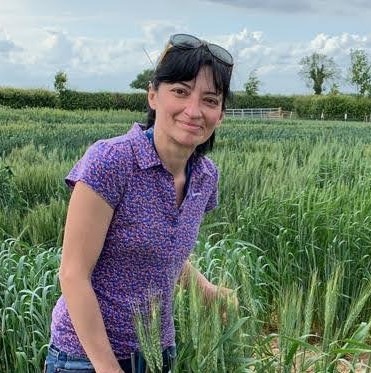Dr Maria Hernandez-Soriano is leading a fascinating investigation into soil microbial diversity as part of the TRUTH project. Her work involves analysing DNA from soil samples collected by Root Rangers across 10 farms, revealing a staggering 15,686 individual species.
The research aims to understand how different farming practices impact soil biodiversity, with early results suggesting that management practices, particularly organic farming, significantly influence microbial diversity.

In year one of the project, Maria assessed samples from the rhizosphere and different parts of the field taken by the 10 Root Rangers. “We were looking at the microbiome across all 10 sites and then assessing each farm individually for differences between them.”
With each of the Root Rangers sending 22 soil samples, Maria and colleagues had 220 samples to analyse. At the John Innes Centre laboratories in Norwich the samples are carefully processed to extract the DNA. The DNA is then prepared for sequencing by specialists to ensure the best quality analysis, and finally sent to a leading provider of sequencing services.
The scientists then compile a ‘library’ of all the DNA found in
the samples, naming matched sequences using extensive databases. The result is a vast spreadsheet listing all the individual microbial species found in each sample – a total of 15,686 across the Root Rangers’ soils.
The next task was to analyse that data, drawing comparisons across different systems and the whole dataset, but also drilling down into individual farms’ results to assess and compare diversity.
The first year of the project has gone well, she says. “At the moment the results are suggesting that management is the strongest influence.” In particular, the organic farmers amongst the Root Rangers had the most diverse samples with a significant difference in nitrification too.
Diversity is important because these microbes work together as part of a complex network, both in cooperation with each other and regulating their different roles in soil.
“It’s a huge community – some of which we know a lot about while others are yet to be characterised.”
Year two of the project is focusing more on the rhizosphere and now with 20 Root Rangers on board the sampling is producing an even stronger dataset.
“Working on the TRUTH project is a dream,” says Maria. “The farmers have been brilliant, and have sent us quality samples meaning that scientists like me can focus on what we do best. Through our work together we can deliver information that is of real value to farmers.”
Upcoming TRUTH trials
In year two of the project, novel wheat varieties are being multiplied up ready for trialling on Root Rangers’ farms in the final year of the project. These include a ‘remarkable’ variety that can regulate its own nitrogen supply.
Originating from Iran, this particular wheat landrace is part of the historic Watkins collection at JIC.
Maria explains: “What is interesting about this particular wheat, is that it has demonstrated capacity to decrease the transformation of ammonium into plant-available nitrate in the soil. This is believed to be an adaptive trait.”
It means much less nitrogen from fertilisers potentially being lost
to the environment and more being taken up and used by the wheat plant itself, because it is controlling the chemical transformation in soil and optimising the uptake.
“We haven’t observed that same capability or trait in any commercial wheat cultivars yet, so that is remarkable!”